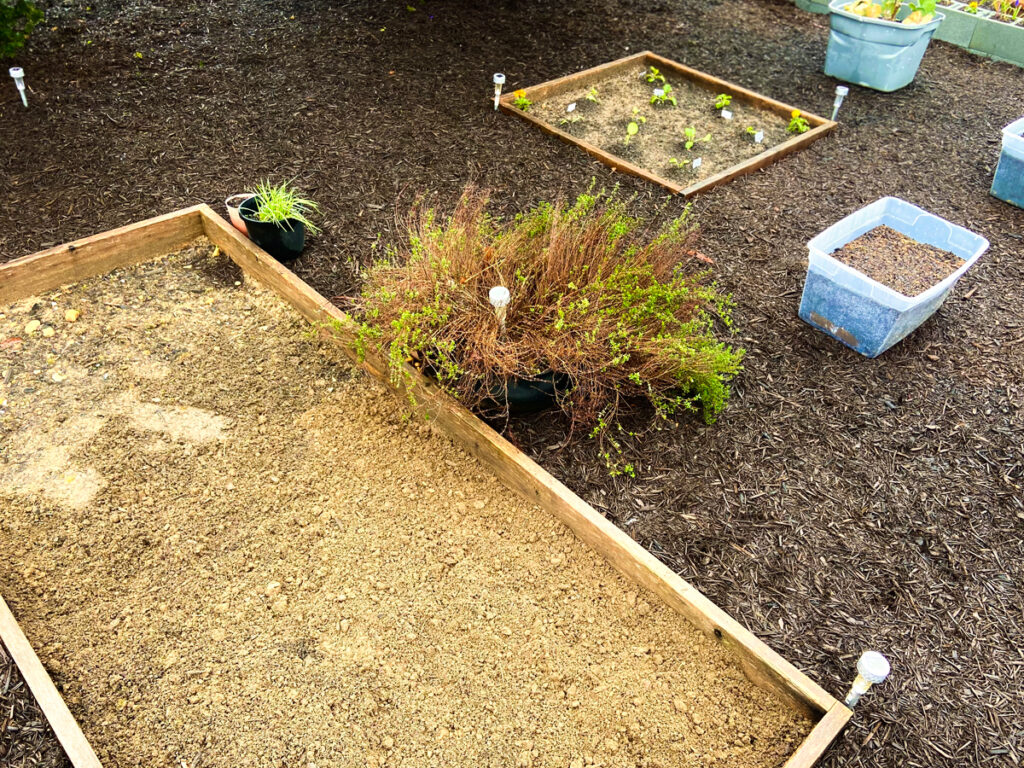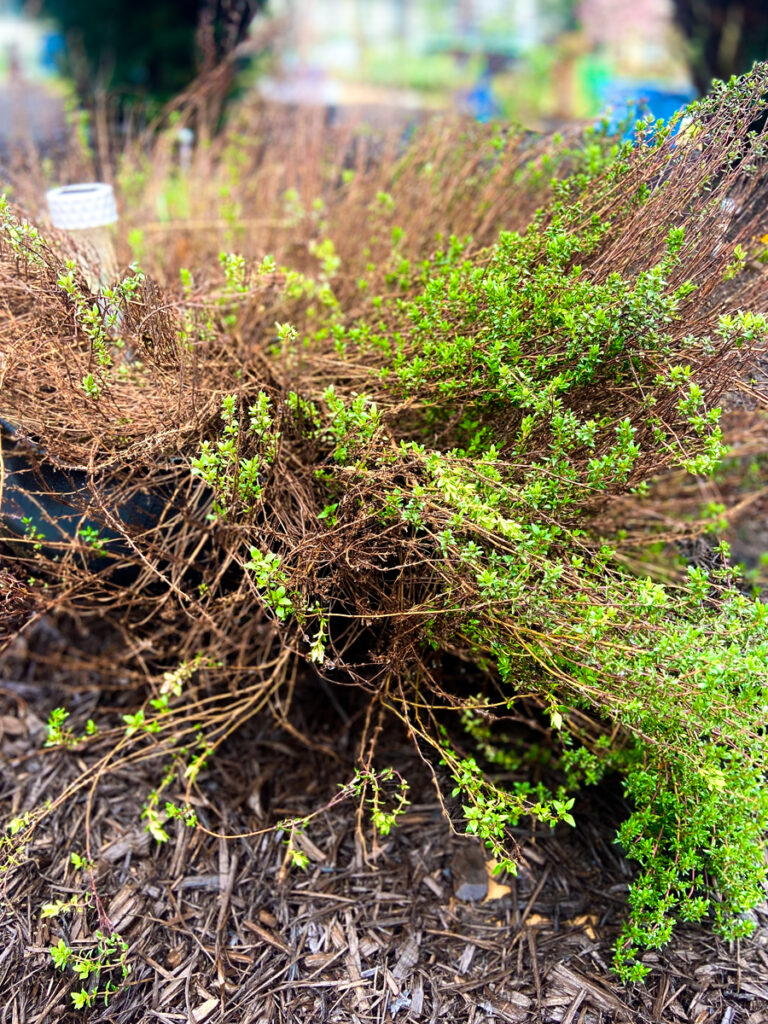Thyme is one of those herbs that once you try it, you absolutely can’t live without it. Growing up Jamaican, I remember my mother using thyme in a lot of her delicious dishes. Sunday afternoons after church, we wouldn’t be home for more than 10 minutes before you’d hear the repeating “ch-ch ch-ch” sound from the pressure cooker and the smell of thyme floating from the kitchen. I’d think to myself, “Mom in there doing her thing!” She’d even use the cooked thyme sprigs as a garnish atop a bed of rice.
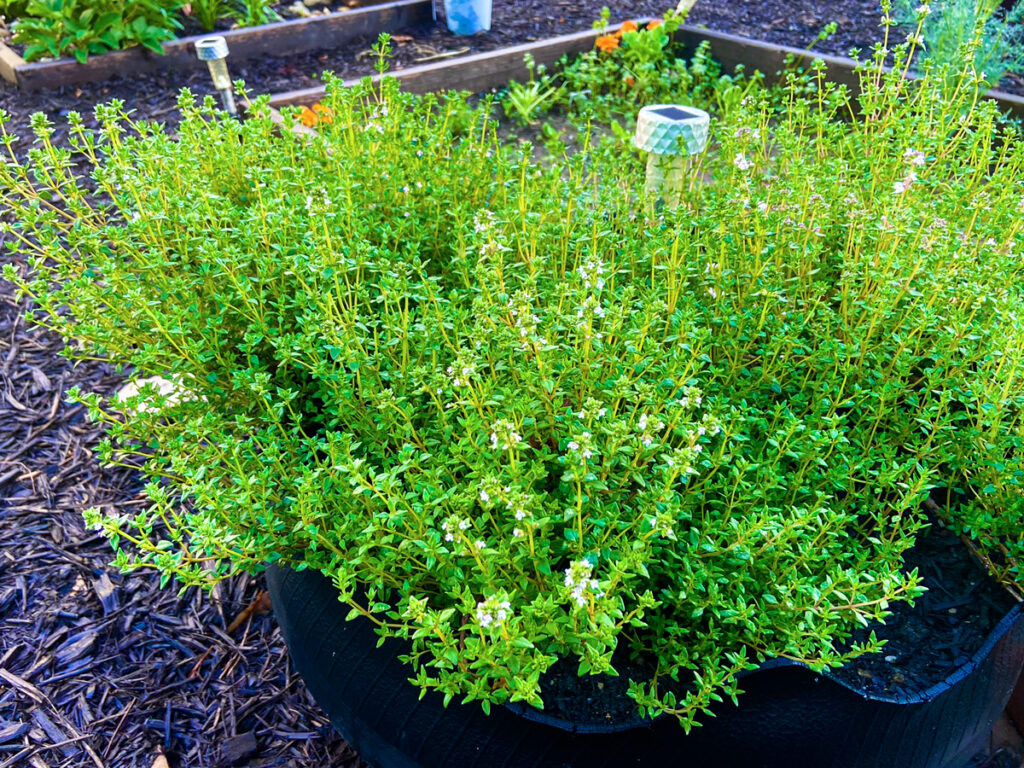
The thyme plant is a perennial herb in the mint family Lamiaceae. It is a multipurpose, powerhouse of an herb, that can be used medicinally, culinarily or to simply to beautify any space. Although it’s packed with bioactive compounds such as p-cymene, myrcene, borneol and linalool, its prime ingredient is thymol.
We have thyme growing in our Backyard Oasis. Other than a good pruning a couple times a year, it requires very little maintenance. I mostly use it to season our food, but recently, I’ve learned that there is so much more to the thyme plant than I thought.
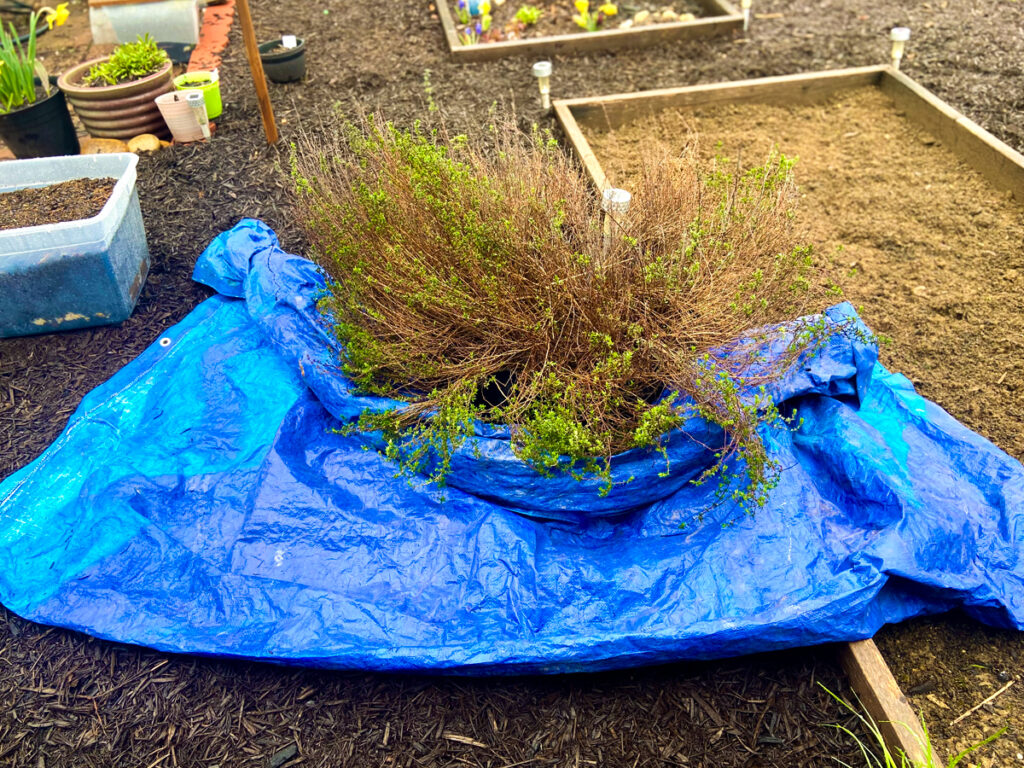
I use tarp to help with clean up. 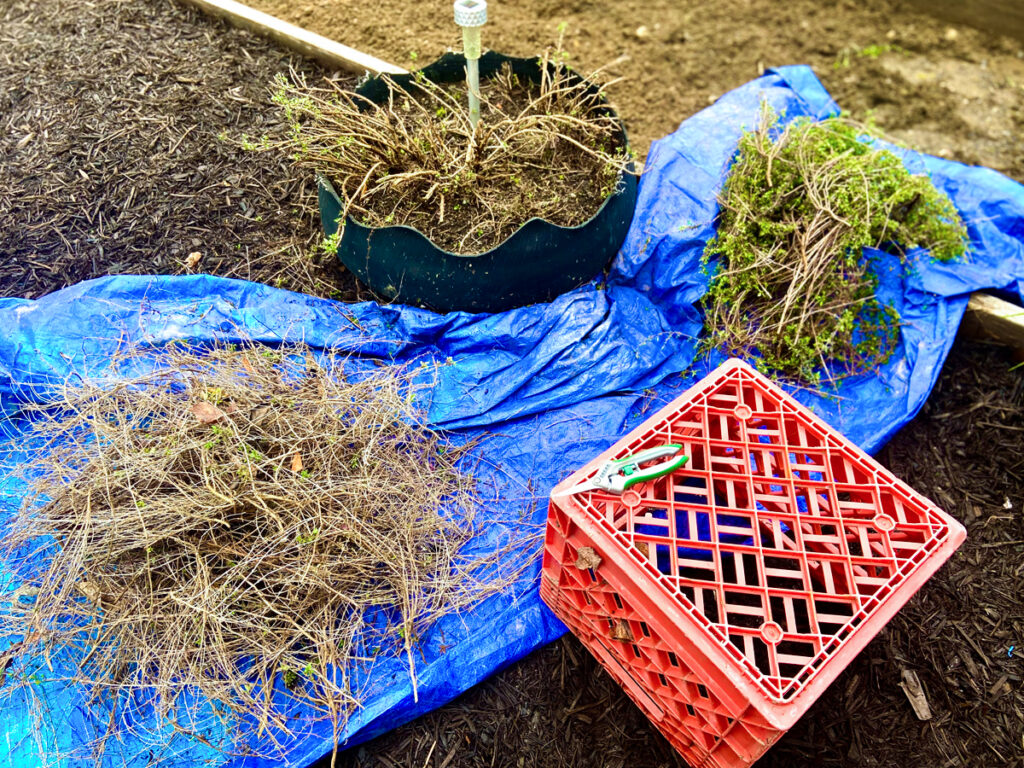
I take my time carefully pruning each branch so the crate saves my back. 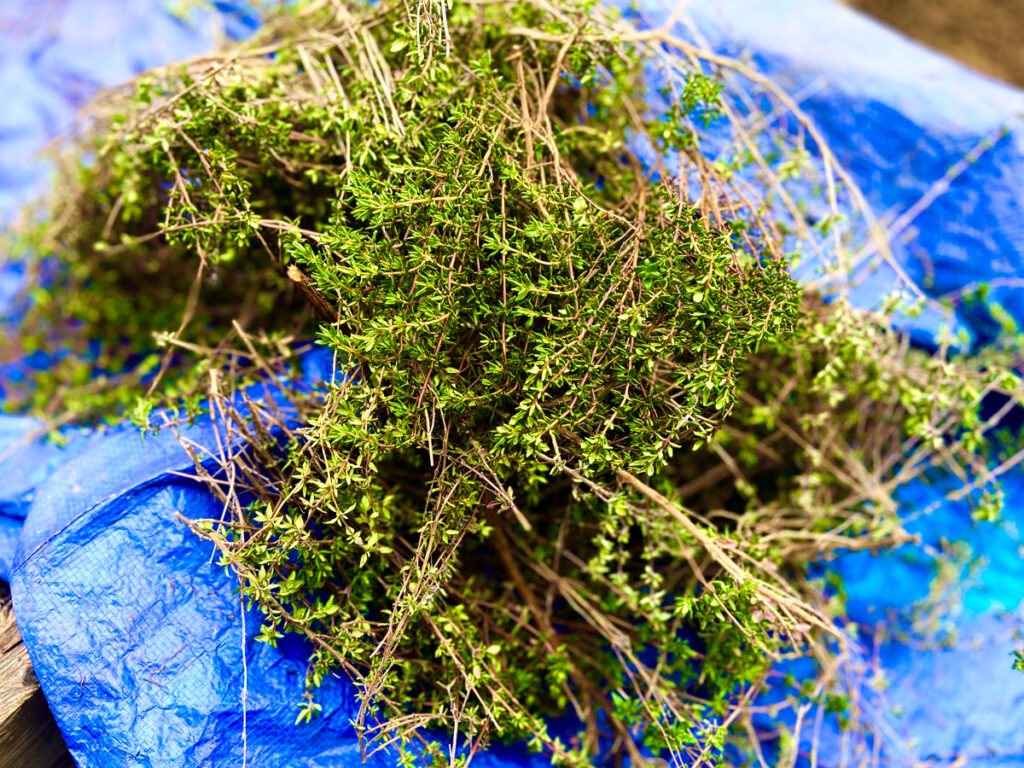
These sprigs are still useful 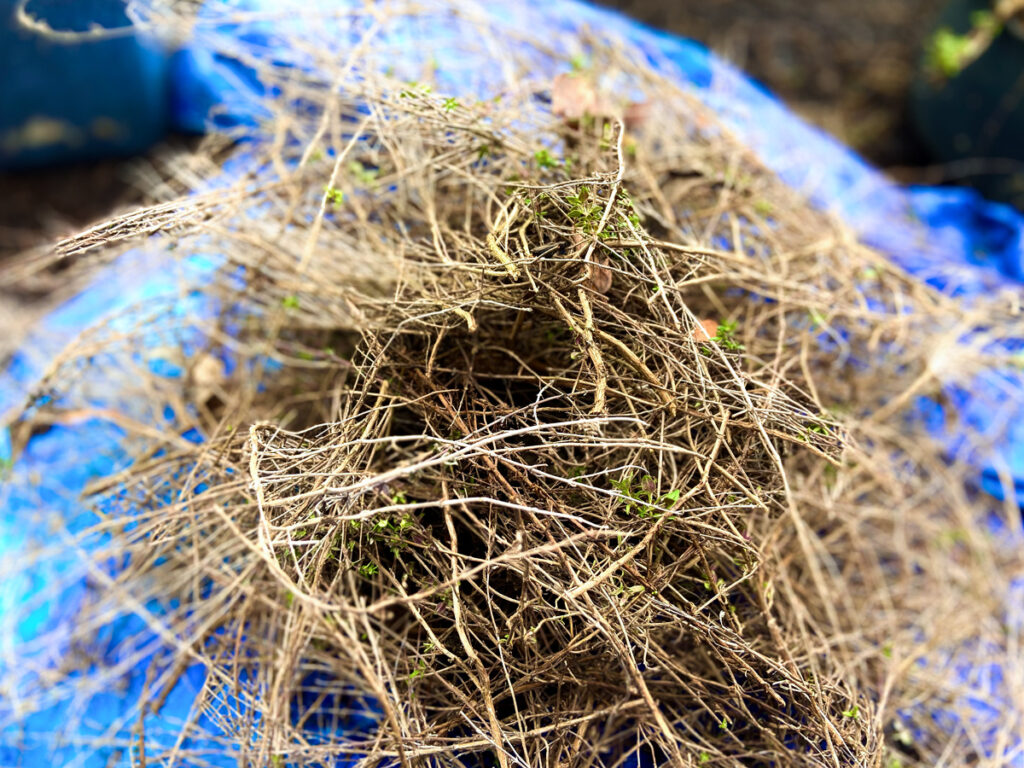
These are the older sprigs. I use this to make homemade pesticide. 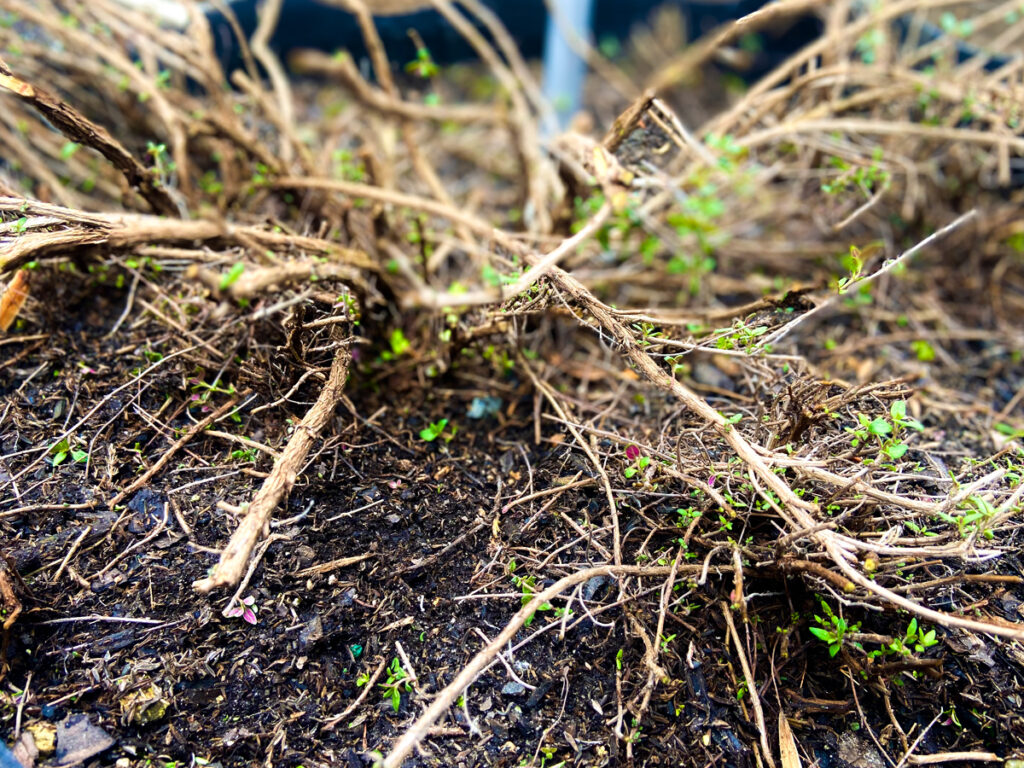
This is the plant after pruning.
About a year ago I was getting a pedicure and the friendly woman sitting next to me shared how thyme saved her from a really bad cold. She went to a couple of doctors and tried a few home remedies, but, “nothing would make that cold to go away” she said. At the grocery store, she came across some fresh thyme and decided she would make herself some tea with it before bed. When she woke up in the morning, to her surprise, she was feeling much better and by that evening, the cold was gone.
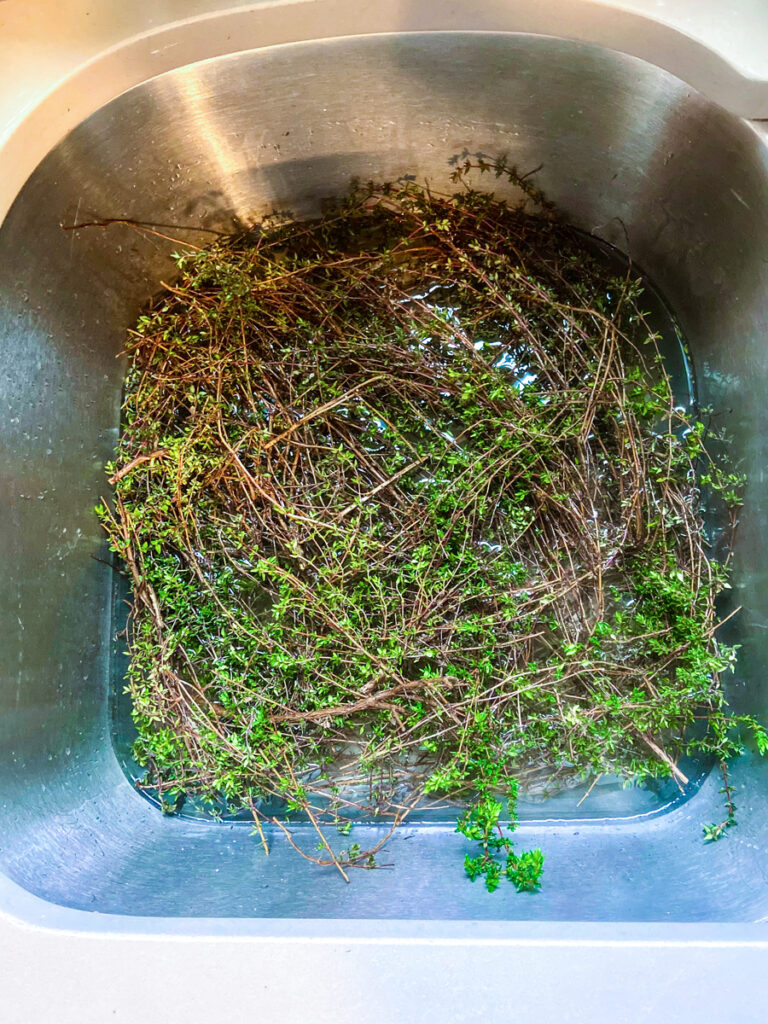
Give everything you harvest from your back yard a good rinse. 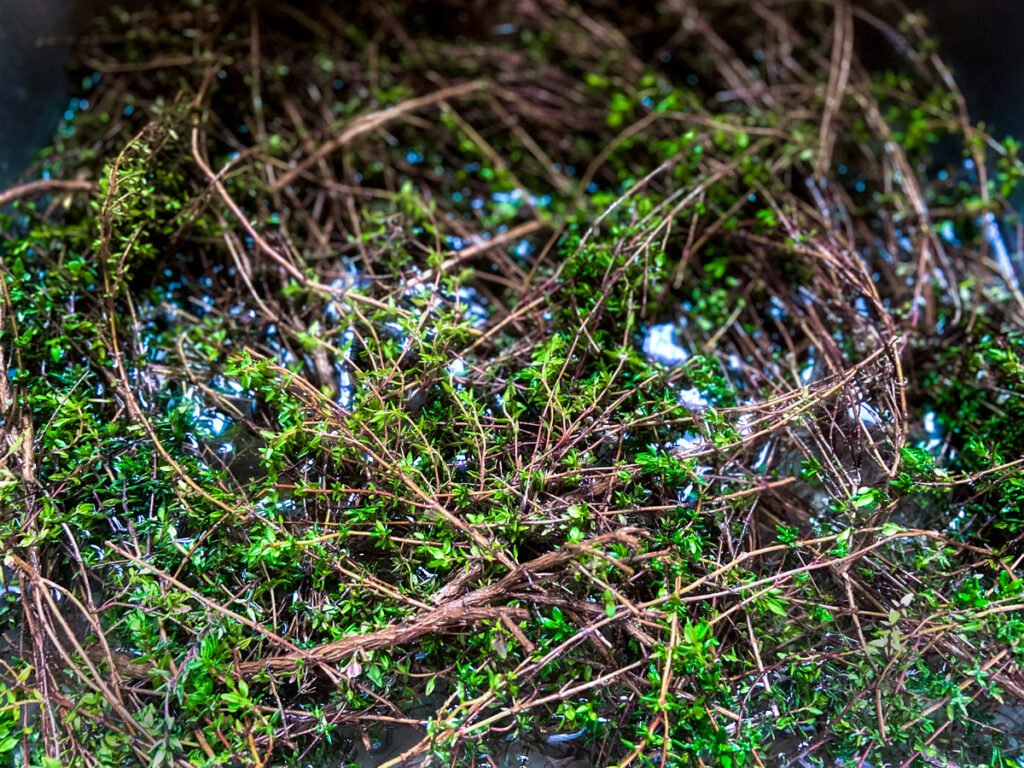
Early this spring, I thought of her after I pruned my thyme plant and decided to make myself some thyme tea as well. It was pretty tasty, almost as if I had made some brown stew broth!
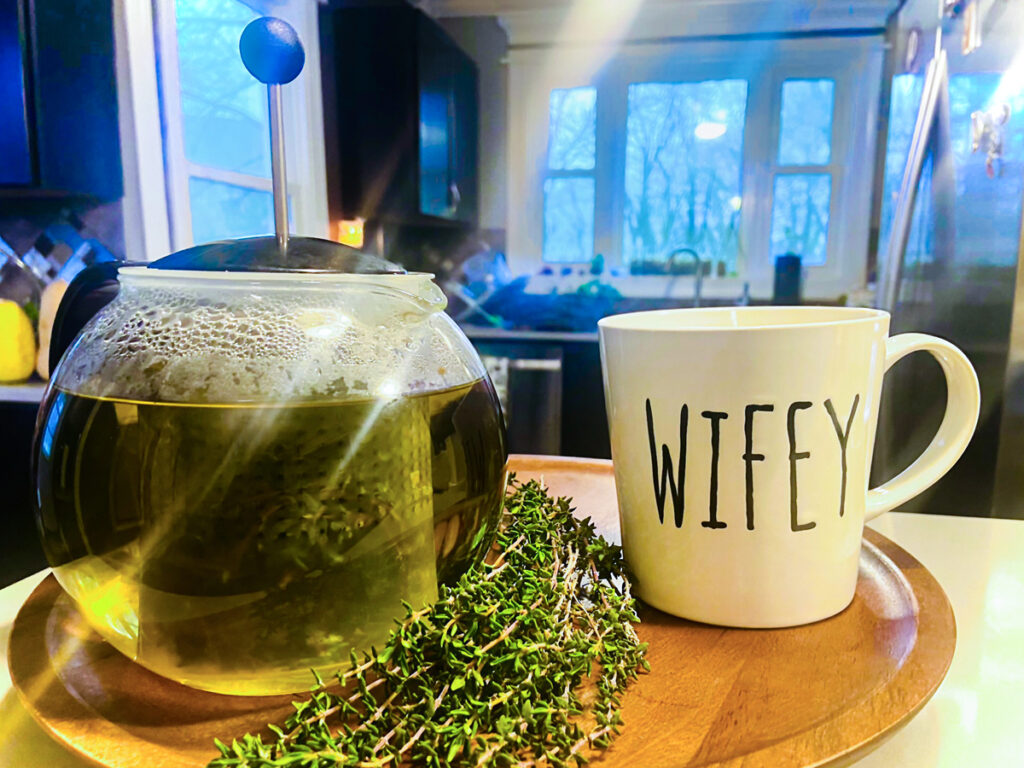
I really appreciated the woman at the nail salon for sharing her experience with me. Thyme came to her rescue and it made me wonder just how beneficial thyme really is to the human body, especially since we have access to continuous supply of it. After some research, it was quite impressing to learn how it’s used differently in various cultures. So much that I was compelled to put together this list of, at least, 10 ways that thyme can benefit our bodies. Talking to my mom, I also found a way that thyme has been used for centuries in the Caribbean. It was pretty mind-blowing, so I added that for you as a bonus. If you find these benefits to be useful and have started incorporating thyme a little more into your lives, it would be great to share it with me in the comments. I’d love to hear about it.
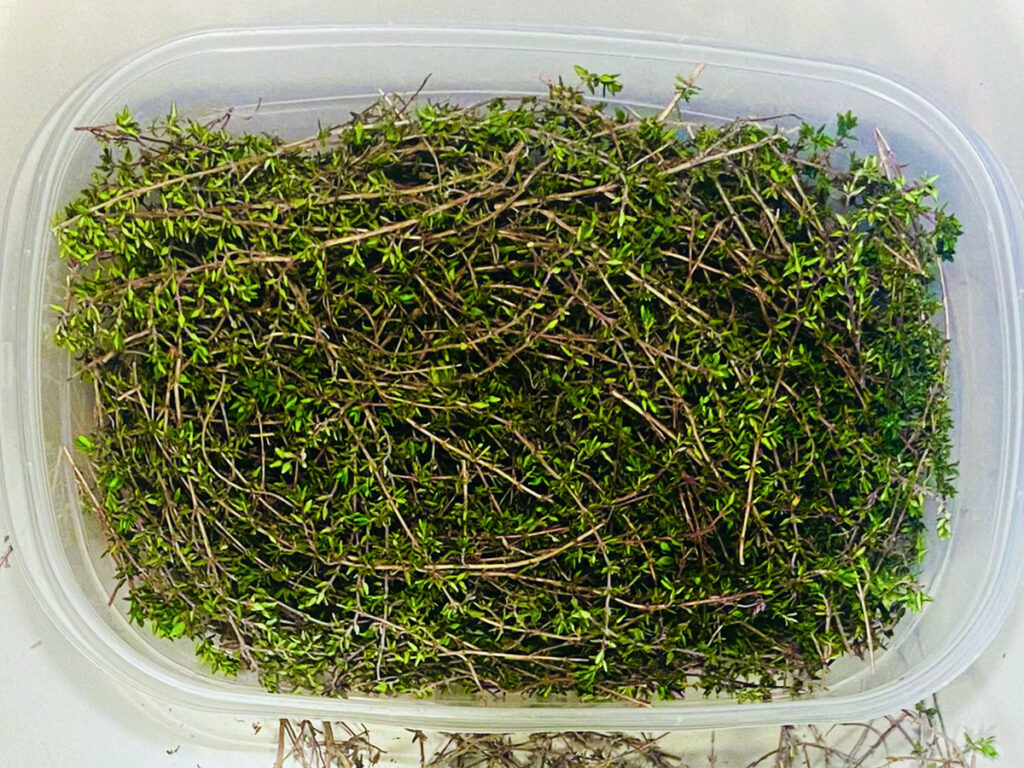
Clean, dry sprigs ready for use and/or storage. 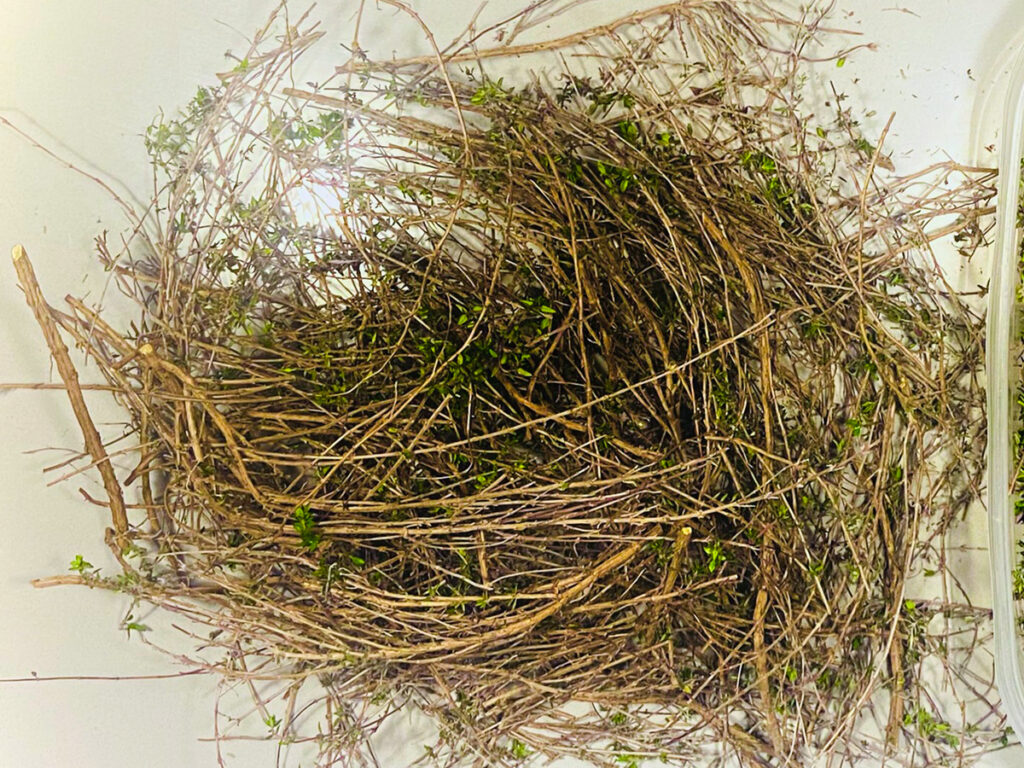
Thyme stems and older sprigs that I’ll use to make DIY pesticide.
1: Boost Your Immunity
Thyme is a great source of Vitamin C. According to the U.S. Department of Agriculture, 1 tbsp of thyme leaves contains 1.35 mg of vitamin C and Vitamin C helps to boost your immune system.
2: Acne Treatment
Looking for an all-natural solution to help alleviate oily skin and acne breakouts? Try making yourself some toner by combining thyme with witch hazel and dab it on problem areas.
3: Alleviate Coughing
In a double-blind, placebo controlled clinical trial, German researchers from the Practice for Internal medicine and Pneumology found that an extract made from a combination of thyme and ivy leaves could alleviate coughing in patients with acute bronchitis.
4: Prevent Hair Loss
Although more research is needed to fully prove its accuracy, a 1998 experiment showed that aromatherapy to be a safe and effective treatment for alopecia areata. Anecdotal evidence also indicates that you can slow down hair loss with by using thyme oil, mixed with other essential oils and a carrier oil. It is also suggested that you incorporate regular scalp massages for maximum effect.
Maybe you’d like to try this aromatherapy scalp treatment, here’s how you can DIY:
- Choose a vegetable oil, such as jojoba oil or grapeseed oil, to act as the carrier oil.
- Mix 2 to 3 cups of the carrier oil with 3 to 5 drops each of thyme, lavender, rosemary, and cedarwood essential oils. Each of these oils have properties that may make them beneficial for hair growth or scalp health.
- Massage a small amount into the scalp daily for about 10 minutes.
- Leave on for an hour or overnight.
- Rinse with a mild shampoo and conditioner.
Be very patient as this treatment may take a few months before you see visible results. Be sure to do a patch test to ensure that you don’t experience any allergic reaction and discontinue immediately if you experience any scalp irritation.
5: Lower Blood Pressure and Cholesterol Levels
Thyme contains Rosmarinic acid which is known to reduce inflammation and blood sugar levels, as well as increase blood flow. It may also help reduce blood pressure. Scientific study has shown that thyme extract can help to reduce heart, lower cholesterol levels and regulate blood pressure levels. Other animal studies have shown that taking thyme extract reduced heart disease risk factors, such as total cholesterol, LDL (bad) cholesterol, triglycerides, and blood pressure.
6: Ease Upset Stomach
Thyme’s antibacterial properties support a healthy digestive tract and help to fight off intestinal parasites. Next time your stomach hurts or you feel your abdominal muscle cramping up, try drinking a warm cup of thyme tea. You can also drink one or two cups daily for an overall healthy gut.
Would you like to make some thyme tea at home, here’s how you can DIY:
Simply steep two to three sprigs (2 teaspoons) of fresh thyme (or 1 teaspoons of dried thyme) in one cup of boiling water. Add lemon, honey or your favorite sweetener and enjoy!
7: Disinfect Wounds
Medicinal plants play a huge role in traditional medicine and herbalists, especially people in rural areas, have been using thyme to cure many ailments for centuries. Topical preparations of thyme tea can be used to take advantage of thyme’s antibacterial properties, gently disinfecting cuts and abrasions. It also has antifungal properties known to combat fungal infections such as athlete’s foot, yeast infections, and ringworm.
Making all nautral thyme rub isn’t hard at all. Here’s how you can DIY:
To use thyme topically, take a few drops of thyme essential oil and rub it on your throat and nose. You can also soak a clean rag in thyme tea and place it directly on the area that needs to be treated. Be sure to let the tea cool first!
8: Boost Your Mood
Thyme contains a stress combatant compound called carvacrol. Next time you’re feeling a little down, load up your diffuser with some thyme essential oil and let the soothing aroma lift your spirits!
9: Fight and Prevent Cancer
I mentioned before that thyme contains numerous compounds with anti-inflammatory, antimicrobial, antioxidant, and antifungal properties. It is very high in luteolin which has been shown to have significant effect in treating prostate, colon and oral cancer cells. Thyme also contains a property called Apigenin and it is known to induce apoptosis in human skin, thyroid, gastric, liver, colon, cervical, and prostate cancer cells. It also inhibits migration and invasion of ovarian cancer cells. A major Italian population study reported that the risk of breast cancer was reduced for increasing intake of the apigenin and luteolin found in thyme. In a 2012 study at Medical Oncology Research Laboratories, School of Medicine, Tulay Aktas Oncology Hospital, Ege University, researchers found that thyme extract may be a “promising candidate in the development of novel therapeutic drugs for breast cancer treatment.”
10: Healthy Teeth and Gums
As a member of the mint family, it’s no surprise that thyme is often used in mouthwashes and oral elixirs. It contains natural chemicals that help defend from tooth decay, gingivitis and general oral infections. Recent research suggest that dental film containing thyme extract is a potential drug delivery device for the topical treatment of periodontal disease.
11: Insect Repellent
Thymol is the main compound found in thyme and thymol is an active ingredient often used in herbicides and pesticides. It repels vertebrate pests by a non-toxic mode of action, but is toxic to microorganisms. Some thymol based pesticides are used for controlling aphids on ornamental plants in ponds and other aquatic sites. Looking for a way to protect your plants from pests, try diluting a few drops of thyme essential oil with distilled water. Mix it in a glass spray bottle and spritz on your plants. You can also combine other essential oils with vodka or witch hazel and concoct a bug spray for yourself too. Have fun experimenting to see which combinations work pests for your skin and the pests in your area.
BONUS: Speed Up Labor
I have to thank my mom for this traditional way of using thyme. In a recent conversation, I shared with her some of the different ways that people have been using thyme and how excited I was to finish up my research and publish this post. Little did I know that she also had memories of how thyme was used when she was a little girl, living in rural, Manchester Jamaica back in the 1950’s. One of those was sparked particular interest and I’m excited to share it!
In the Caribbean, back in the traditional days, thyme tea was prepared and given when a full-term pregnant woman would take a long time to deliver her baby. C-sections were not available at the time and only the rich could afford nurses and midwives, so the neighborhood women would prepare thyme tea and have the mom-to-be drink it. Thyme causes the uterus to contract, which stimulates contractions and sends her into labor.It is believed that it also boosts the production of milk in nursing moms.
Possible Side Effects
Although thyme has many beneficial properties, some people may be allergic or develop skin sensitivity after using it. Consider discontinuing your use of thyme oil if you have any of the following adverse reactions: (use bullet points) dizziness, conjunctivitis, muscle weakness, asthma, headache, gastrointestinal irritation and distress, and fever.
Thyme is safe when used in food, but care should be taken when used in large quantities as it can kill the good bacteria in the gut. It can also reduce blood clotting, so I’d avoid using it a coupe weeks before surgery or if you have issues with your blood clotting. Thyme can also act as an estrogen in the body. If you have a condition that can be made worse by exposure to estrogen, do not use it.
Thyme essential oil shouldn’t be swallowed. Don’t use it undiluted on your skin. Consider diluting significantly when giving any essential oil to children. Even when diffusing, keep in mind those who may react adversely to the smell. If you are pregnant, nursing, or under a doctor’s care, talk to your physician before using thyme oil. Avoid contact with sensitive areas such as eyes, inner ears, etc.
*PubMed Central is a highly respected database from the National Institutes of Health
